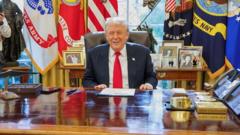Can Switzerland's Charm Offensive Cut Trump’s Tariffs?

Published: 2025-11-13 22:00:41 | Category: world
Swiss ministers are currently in Washington seeking to negotiate a reduction of the steep 39% tariffs imposed by the US on Swiss exports, a rate deemed the highest in Europe. Following initial unsuccessful discussions by Swiss President Karin Keller Sutter, a visit from Swiss business leaders has reportedly led to a more promising dialogue with President Donald Trump, indicating a potential reduction in tariffs.
Last updated: 29 October 2023 (BST)
What’s happening now
In a significant shift, Swiss officials are making headway in their attempts to negotiate lower tariffs with the US. The latest talks involve Swiss economy minister Guy Parmelin and chief trade negotiator Helene Budliger Artieda, who are reportedly feeling more optimistic than in previous months. Following a meeting between Trump and prominent Swiss business figures, including luxury goods executives, there are indications that the 39% tariff might be reduced to 15%, aligning it with rates faced by Switzerland's EU neighbours.
Key takeaways
- The 39% tariff on Swiss exports to the US is the highest in Europe.
- President Trump has shown signs of softening his stance, stating he is working on reducing the tariffs.
- Swiss business leaders have engaged in unconventional diplomacy, including gifting luxury items to Trump.
Timeline: how we got here
Since the introduction of the 39% tariff, the Swiss government has been actively seeking its reduction. Key dates include:
- 4 November 2023: Swiss business leaders met with Trump in the Oval Office, presenting gifts, including a Rolex watch and a gold bar.
- September 2023: Trump attended the US Open, where he interacted with Swiss watch executives, hinting at the ongoing tensions over tariffs.
- August 2023: Fifa President Gianni Infantino visited Trump, suggesting potential diplomatic channels for Switzerland.
What’s new vs what’s known
New today/this week
Recent discussions suggest that the US administration is considering reducing tariffs on Swiss goods. Trump has indicated that negotiations are in progress, and a proposed new rate of 15% is on the table, contingent on reciprocal commitments from Swiss companies.
What was already established
Before these recent developments, the Swiss government had faced significant challenges in persuading the US to alter its tariff policy. Initial efforts by President Sutter were not well received, and the 39% tariff had already begun to impact the Swiss economy negatively.
Impact for the UK
Consumers and households
While this negotiation primarily affects Switzerland, there may be indirect implications for UK consumers, especially in sectors reliant on Swiss products, such as luxury goods and pharmaceuticals. A reduction in tariffs could lead to lower prices for these products in the UK market.
Businesses and jobs
For UK businesses, particularly those in luxury retail or commodities, the outcome may influence supply chains and pricing strategies. Swiss firms have hinted at expanding operations in the US, which could alter their investment strategies in the UK market.
Policy and regulation
The UK government is likely monitoring the developments closely, as changes in US tariffs could affect trade negotiations post-Brexit. Any significant shifts may prompt the UK to reassess its own trade policies with both the US and Switzerland.
Numbers that matter
- 39%: Current tariff rate on Swiss exports to the US, the highest in Europe.
- 15%: Proposed new tariff rate, aligning with EU rates.
- Thousands: Number of jobs at risk in Switzerland if tariffs remain unchanged.
Definitions and jargon buster
- Tariff: A tax imposed on imported goods, which can affect pricing and market access.
- Fifa: The Fédération Internationale de Football Association, the international governing body of football.
How to think about the next steps
Near term (0–4 weeks)
Expect to see further negotiations as Swiss ministers continue discussions in Washington. Monitor any announcements from Trump's administration regarding tariff adjustments.
Medium term (1–6 months)
Watch for developments from Swiss companies as they respond to potential tariff changes. Increased investment from Swiss firms in the US may alter their operations in the UK and EU.
Signals to watch
- Official announcements from the US government regarding tariff changes.
- Statements from Swiss industry leaders about operational adjustments.
- Updates on Swiss exports to the US and their impact on employment within Switzerland.
Practical guidance
Do
- Stay informed about developments related to US tariffs on Swiss goods.
- Monitor how changes might affect pricing and availability of luxury goods in the UK.
Don’t
- Don’t assume that any changes will have immediate effects on markets or prices.
- Don’t overlook the broader implications for UK businesses tied to Swiss exports.
Checklist
- Check for announcements from the US government regarding tariff negotiations.
- Review how your business might be affected by potential changes to Swiss products.
- Stay updated on industry news from both Swiss and UK markets.
Risks, caveats, and uncertainties
While indications suggest a potential reduction in tariffs, the negotiations are ongoing, and outcomes remain uncertain. The willingness of the US administration to enact changes may fluctuate based on political considerations. Additionally, any commitments from Swiss companies to invest in the US may not be realised, impacting the overall effectiveness of the negotiations.
Bottom line
The Swiss government is engaged in crucial negotiations with the US aimed at reducing high tariffs that have adversely affected their economy. With promising signs from President Trump, the next few weeks will be critical in determining the future of Swiss exports to the US, and by extension, the potential ripple effects on the UK market.
FAQs
What are the current tariffs on Swiss exports to the US?
The current tariffs on Swiss exports to the US stand at 39%, which is the highest rate in Europe.
How might the tariff reduction affect Swiss companies?
A reduction in tariffs could alleviate financial pressures on Swiss companies, helping to sustain jobs and operations that have been threatened by the existing high rates.
What role do gifts play in diplomatic negotiations?
Gifts are often used in diplomatic contexts to foster goodwill and can serve as a form of soft diplomacy, potentially influencing negotiations.



